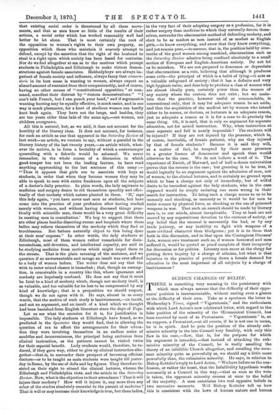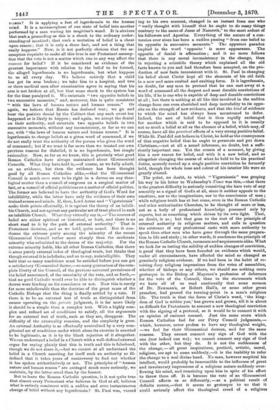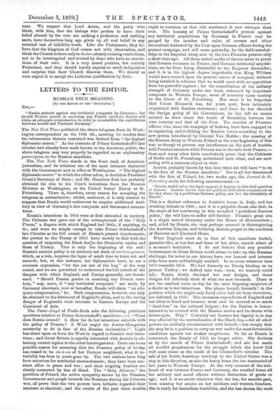SUDDEN CHANGES OF BELIEF.
THERE is something very amusing in the persistency with which men always assume that the difficulty of their oppo- nents' position is insurmountable, without casting even a glance at the difficulty of their own. Take as a specimen the letter to Wednesday's Times, signed " Vigornienais," and the enthusiasm with which Lord Acton's now celebrated letter, with regard to the false position of the minority of the (Ecumenical Council, has been received by most of us Protestants. " Vigorniensis " is, as we suppose, a Protestant,—at all events, if he is not one in name, he is in spirit. And he puts the position of the already sub- missive minority in the late Council very forcibly, with only this flaw in his case,—flaw, that is, for the purpose for which his argument is intended,—that instead of attacking the sub- missive minority of the Council, he is really assailing the theory of an infallible Church altogether, and assailing the recu- sant minority quite as powerfully as, we should say a little more powerfully than, the submissive minority. He says, in relation to Bishop Ketteler's reply to Lord Acton, " We have before us the con- fession, or rather the boast, that the Infallibility hypothesis works necessarily at a Council in this way,—that as soon as the vote is taken, the opponent minority crosses at once to the belief of the majority. A man entertains two real opposite beliefs in two successive moments. Will Bishop Ketteler tell us how this is consistent with the laws of human nature and human rksson? It is applying a feat of legerdemain to the human mind. It is a metamorphose of one state of belief into another performed by a man waving his magician's wand. It is obvious that such a proceeding as this is a shock to the ordinary under- standing-of mankind ; that such a mutation of belief is a cheat upon reason ; that it is only a sham fact, and not a thing that really happens." Now, is it not perfectly obvious that the as- sumption requisite to make all this true is our Protestant assump- tion that the vote is not a matter which can in any way affect the reasons for belief ? If it be considered as evidence of the greatest importance with relation to the belief to be formed, the alleged legerdemain is no legerdemain, but what happens to us all every day. We believe entirely that a child has got its arm broken ; we take him to a hospital, and two or three medical men after examination agree in saying that his arm is not broken at all, but that some shock to the system has for the time paralyzed it. We entertain " two opposite beliefs in two successive moments," and, moreover, this is quite consistent " with the laws of human nature and human reason." Or again, we believe that Russia has declared war; we go and hear the positive denial by the Cabinet that any such event has happened or is likely to happen ; and again, we accept the denial on their authority, and entertain two opposite beliefs in two successive moments, without any inconsistency, as far as we can see, with "the laws of human nature and human reason." It is legerdemain to change beliefs at a given word of command, if we do not really trust the authority of the person who gives the word of command ; but if we trust it far more than we trusted our own previous reasons for disbelief, it is no legerdemain, but simple rationality. Now, as far as we know, this is precisely what good Roman Catholics have always maintained about (Ecumenical Councils. What they have held is,—of course, as we fully admit, on no evidence, but then the evidence has been thought good by all Roman Catholics alike,—that the (Ecumenical Council is much more sure to be right in a decree on any theo- logical matter than a council of surgeons on a surgical matter of fact, or a council of official politicians on a matter of official politics. The former are believed to have the authority of God's Word for infallibility, while the latter have only the evidence of their own trained senses and minds. If, then, Lord Acton and "Vigorniensis" make their points effectually, it is against the theory of an infalli- ble Church, and not against any particular act of trust placed in such an infallible Church. What they virtually say is,—' The sources of belief are either spiritual or historical, or both, and there is no short road to it by the path of external authority.' That is Protestant doctrine, and as we hold, quite sound. But it con- demns the extreme party among the minority of the recent tEcumenical Council rather more sharply than the moderate minority who submitted to the decree of the majority. For the extreme minority holds, like all other Roman Catholics, that there is some purely external index of theological truth, but thinks that though external it is indefinite, and so to say, unintelligible. They hold that so many conditions must be satisfied before you can get a satisfactory (Ecumenical decree,—so many guarantees of the com- plete liberty of the Council, of the previous universal prevalence of the belief announced, of the unanimity of the vote, and so forth,— that no good Catholic would ever be able to distinguish whether a decree were binding on his conscience or not. Now this is surely far more unbelievable than the doctrine of the great mass of the Catholic Bishops that the thing is finally settled by a vote. If there is to be an external test of truth as distinguished from causes operating on the private judgment, it is far more likely it should be a simple than a complex test. With a highly com- plex and refined set of conditions to satisfy, all the arguments for an external test of truth, such as they are, disappear. The difficulty of the externality remains, and the simplicity is gone. An external Authority is as effectually neutralized by a very com- plicated set of conditions under which alone its exercise is asserted to be legitimate, as it is by the blank rejection of it altogether. We can understand a belief in a Church with a well-defined external organ for saying plainly that this is truth and this is falsehood, though we do not share it,—but we cannot at all understand the belief in a Church asserting for itself such an authority so ill- defined that it takes years of controversy to find out whether it has spoken authoritatively or not. The principles of "human nature and human reason" are outraged much more seriously, we maintain, by the latter creed than by the former.
But to leave the Roman Catholic question, is it not quite true that almost every Protestant who believes in God at all, believes what is entirely consistent with a sudden and even instantaneous change of belief without any legerdemain? St. Paul was, accord ing to his own account, changed in an instant from one who " verily thought with himself that he ought to do many things contrary to the name of Jesus of Nazareth," to the most ardent of his followers and Apostles. Everything of the nature of a con- version ever since has been a sudden passing " from one belief to its opposite in successive moments." The apparent paradox implied in the word ' opposite ' is mere appearance. The opposite of denial is affirmation ; and it no more follows that there is any moral inconsistency in the change, than in rejecting a scientific theory which explained all the old facts known to you and had therefore been accepted, on the pro- duction of new facts inconsistent with it. St. Paul in changing his belief about Christ kept all the elements of his old faith in a new and more exalted and exalting form. It is legerdemain, no doubt, for any man to pretend that he can cast away at a word of command all the deepest and most durable convictions of his life, if he is one who is capable of deep and durable convictions at all ; but there is nothing at all like this involved in the sudden change from one even cherished and deep incredulity to its oppo- site on the strength of new evidence, and that the kind of evidence to which the mind has always been accustomed to defer. Indeed, the sort of belief that is thus rapidly exchanged for another which is said to be opposed to it is usually not so much a belief at all as the absence of a belief, which may, of course, have all the practical effects of a very strong positive belief. While St. Paul did not believe in Christ, he held as the consequence of that negative belief that he ought to persecute and put down Christians,—not at all a sound inference, no doubt, but a suffi- ciently important one. Yet the events of a moment, by giving him a new reason for belief, and with it a new belief, and so altogether changing the course of what he held to be his practical duties, scarcely rooted up a single positive conviction he formerly held, though the whole tone and colour of his interior life were so greatly altered.
The point, no doubt, to which " Vigorniensis " was groping his way in his letter to Wednesday's Times was this,—that there is the greatest difficulty in seriously conceiving the bare vote of any assembly as a signal of God's at all, since it neither appeals to the emotions, nor to the imaginations, nor to the consciences of men ; while religious truth has at last come, even in the Roman Catholic and other authoritative Churches, to be thought of more or less, not as a body of professional knowledge possessed only by experts, but as something which shines by its own light. That, no doubt, is so ; but that goes to the root of the principle of external authority in religions matters, and calls in question the existence of any professional caste with more authority to speak than other men who have gone through the same prepara- tion in life and study ; in other words, it condemns the principle of the Roman Catholic Church, recusants and acquiescents alike. What we look for as testing the solidity of sudden changes of conviction, is proof that they have been founded on evidence which would, under all circumstances, have affected the mind so changed as genuinely religious evidence. If we had been in the habit of re- ceiving deep religious impressions from the votes of assemblies, whether of bishops or any others, we should see nothing more grotesque in the Bishop of Mayence's profession of deference for the vote of the Council, than in the statements which we have all of us read continually that some sermon of Dr. Newman's, or Robert Hall's, or some other great preacher, had proved the turning-point in a man's religious life. The truth is that the force of Christ's word, ' the king- dom of God is within you,' has grown and grown, till it is about as difficult for Protestants to connect a new theological conviction with the signing of a protocol, as it would be to connect it with an opinion of eminent counsel. Just the same seorn which Roman Catholics feel for our Privy Council judgments,— which, however, never profess to have any theological weight, —we feel for their (Ecumenical decrees, and for the same reasons. They cannot connect any sign of God with the one (nor indeed can we); we cannot connect any sign of God with the other, but they do. It is not the suddenness of the change, — all great inspirations, poetical, artistic, moral, religions, are apt to come suddenly,—it is the inability to refer the change to a real divine hand. No man, however sceptical his intellect, would probably be inaccessible to the influence of great and involuntary impressions of a religious nature suddenly over- flowing his mind, and remaining upon him in spite of his effort to throw them off. It is because the vote of an (Ecumenical Council affects us so differently, —as a political result of definite causes,—that it seems so grotesque to us that it could seriously affect the theological creed of a religious
man. We suspect that Lord Acton, and the party who think, with him, that the bishops who profess to have their belief altered by the vote are making a profession and nothing more, have themselves long ago given up all real belief in any external teat of infallible truth. Like the Protestants, they be- lieve that the kingdom of God comes not with observation, and think the Church is there only to declare already existing convictions, not to be interrogated and trusted by those who have no convic- tions of their own. It is a very sound position, but entirely Protestant, and they should hardly express so much indignation and surprise that their Church disowns them. We should as soon expect it to accept the Lutheran justification by faith.




































 Previous page
Previous page